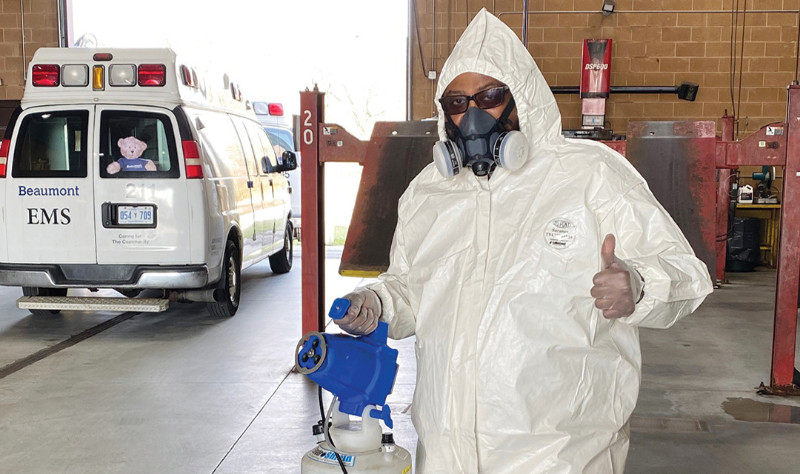
Jared Rothberger has been sanitizing emergency response vehicles during the pandemic.
Here are how some Metro Detroit Jewish business owners are changing to succeed despite the pandemic.
According to a survey from the Small Business Administration of Michigan, one in seven Michigan small businesses, or 14 percent, are not confident they will survive the COVID-19 pandemic.
Those trying to weather the storm have had to adjust their business models and do their best to adapt to a new reality. Here are how some Metro Detroit Jewish business owners are changing to succeed despite the pandemic.
Mortgage Sector
Bob Rubin is in the mortgage business at HomeLend USA, based in Troy. “During the pandemic, I’ve been able to do all of my business from home,” he said. “I’ve also decided to use this time to give back.”
With new technology, Rubin can help customers get their required paperwork and signatures, so they never have to leave their homes or let an appraiser or closing agent inside – perfect for maintaining social distancing.
Rubin decided to turn his attention to religious organizations, churches and synagogues. “With rates so low, this is an ideal time for them to refinance mortgages and save several hundred dollars every month,” he said. “With most synagogues closed, they could really use the extra money now.”
Rubin added that he wanted to do something nice for someone else, as well. “For new customers, I make a $1,000 donation to their favorite charity or religious organization,” he said.
One customer recently chose Congregation Beth Shalom, which received a check from Rubin.
“Sometimes I don’t make any money on the loan at all, but I feel like I’m making a difference,” he said.
Staffing
Kristi Siegel, founder and president of Statewide Staffing in Farmington Hills, said the pandemic has severely impacted her business due to the inability to make wide-scale hiring decisions following the shelter-at-home executive order and social distancing guidelines.
“A company like ours bases its work off of interviewing candidates and meeting with new clients,” she said in an email. “We also interact with our clients while they utilize our office for confidential hiring searches. Through the shelter-in-place order, this currently isn’t being done. Fortunately for us and those we represent on both ends of the hiring process, much of this process can still be done virtually.”
Virtual face-to-face meetings have become Statewide Staffing’s main source of communication and have allowed them to get candidates in the door for positions without the need for in-person interviews.
As of May 15, it was back to work as usual for Statewide Staffing. “We plan to quickly identify and place top talent in other industries as the market begins to adjust,” Siegel said. “We anticipate it will take at least a few months, if not more, for things to normalize.”
Retail
Before Michigan Gov. Gretchen Whitmer’s stay-at-home order closed the doors at Event Bliss in Franklin, the company had a “decent” social media presence, according to owner Terri Trepek. “After, we had to go full force – posting photos and asking clients to message us or call us if they wanted to buy something. Then we would run to the store, get the item and drop it off,” she said. “Now customers can pick up items curbside.”

Courtesy of Event Bliss
Early during the stay-at-home order, before face masks were necessary for people going in public places, Event Bliss decided to offer unique face masks for customers, including one for new grads.
“We thought,’What do we have to lose?'” Trepek said. “We’re not making any profit off the masks – the profits go to charity -but people want them, and it keeps us in front of our customers’ minds.”
Trepek is optimistic about the future. “We are definitely going to make it. People want to shop; that’s the good thing,” she said. “But how we shop is going to be very different. We will do more by-appointment sessions with our customers and keep working through our social media.”
Janitorial
Deemed essential workers by Whitmer, Jan-Pro in Southfield never had to close; however, a third of its customers did, according to owner Jared Rothberger. That left the company scrambling to increase revenue so it wouldn’t have to reduce staff.
Late last year, the company started a supply business, offering their customers and the public masks, gloves, toilet paper, paper towel and hand sanitizer, among other items.
That business has taken off.
“We did about $4,000 worth of business in November, compared to several hundred thousand in April,” Rothberger said. “That’s helped us make payroll.”
As the economy in Michigan slowly begins to re-engage, Jan-Pro is sharing how use of its disinfectant spray EnviroShield can help slow the spread of COVID-19, keeping employees and customers safe. EnviroShield eliminates 99.9% of bacteria and viruses on exposed surfaces in a building. It wraps around surfaces to hit hard-to-reach areas, and has been used in hundreds of local facilities over the last several years, including childcare facilities, medical facilities and schools.
Throughout the pandemic, JAN-PRO has given free EnviroShield sprays for all police, fire and EMS vehicles, precincts and fire stations. As part of the process, Rothberger was able to get behind the wheel of those first-responder vehicles for short drives. “I lived out my dream to drive a fire truck, police car and ambulance,” he said. “My 10-year-old self was so proud.”

Courtesy of Jan-Pro
Real Estate
Dan Gutfreund of Signature Sotheby’s in Birmingham has been selling real estate for a long time. Before COVID-19 hit, he was selling two or three homes a week. During the stay-at-home order, he sold four homes total. Technology helped. Using MatterPort 3D technology, agents were able to give clients virtual homes tours.
Whitmer allowed the real estate sector to relaunch with limits on May 7. Gutfreund said that was welcome news, although he and his team are having to adapt the way they sell homes to help slow the spread of the virus.
Now that people are once again able to walk through homes, changes had to be made.
“We’ve put sanitization stations in every one of the homes we’re showing,” he said. The stations contain masks, booties and sanitizers. Showings are limited to four people and “perspective buyers are asked to touch nothing and maintain CDC social distancing standards,” he said.
Open houses are still not allowed, so technology will continue to play a big role, Gutfreund said. “We’re doing virtual open houses on Facebook video, using Zoom and providing 3D tours online.”
He said his employees are going to continue working from home, and title companies and banks are allowing closings to take place online. “Health and safety remain top of mind,” he said.
He says the industry has a positive outlook for the future.
“There is pent-up demand and interest rates and inventory are at all-time low. This truly is a sellers’ market. I think the market will snap back as soon as the governor relaxes the rules.”
Getting Back to Business
Whitmer continues to allow different sectors of the economy to re-engage. Her stay-at-home order was set to expire May 28, and on May 26 she opened up retail and auto dealers by appointment only.
To make transitioning easier, the Small Business Association of Michigan has developed resources to assist small businesses.
“Getting back to work will require changes for small businesses that could be overwhelming,” said SBAM President Brian Calley in a statement.
The “Get Back to Work Safely Guide” includes tips and resources for issues that small businesses may face, including revising employee policies and employee handbooks, as well as talking with employees about new expectations. The guide also provides checklists on PPE use, cleaning and health screenings, as well as other considerations small businesses may need to take on in their facilities.
The guide is available at sbam.org/Resources/COVID-19-Resources.

